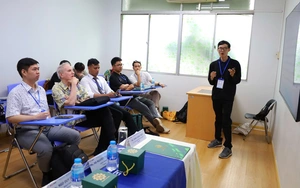
A file photo shows students attending a science lesson taught in English in Ho Chi Minh City. Photo: Nhu Hung / Tuoi Tre
Editor’s note: Darren Chua currently works at a multinational corporation, one of Asia’s established broking houses, and previously spent four years teaching English in Vietnam.
This piece was written at the request of Tuoi Tre News about Vietnam’s new national education plan, which will make English a compulsory subject from first grade, with the goal of establishing it as the second language in schools by 2045.
As a Singaporean fluent in English, Chinese, and Vietnamese, I’ve experienced first-hand how multilingual proficiency can open doors, especially in the world of finance.
Over the past 12 years living and working in Vietnam, I’ve seen the country evolve rapidly, and its latest education policy marks a bold step forward.
Vietnam’s plan to make English compulsory from Grade 1 and gradually elevate it to second-language status in schools by 2045 is ambitious, forward-thinking, and deeply strategic. It reflects the nation’s desire to integrate more deeply into the global economy and attract foreign investment.
In finance, English fluency is often a prerequisite for cross-border transactions, client communications, and accessing international markets.
Making English foundational from an early age could transform Vietnam’s workforce over the next two decades, equipping young professionals with the tools to thrive in global industries.
Opportunities on the horizon
This policy could catalyze a wide range of positive developments, including expansion of English teaching jobs, especially for qualified foreign educators; growth in EdTech and private tutoring, as parents seek to supplement school instruction; improved access to global knowledge, enabling students to engage with international research, media, and business tools; and enhanced global employability, particularly in sectors like finance, tourism, and technology.
As an English teacher in Vietnam for four years, I’ve seen first-hand how eager the younger generation is to learn.
This policy has the potential to unlock a new wave of globally-minded professionals who can confidently navigate international landscapes.
Challenges to address
Despite its promise, the policy faces several challenges, such as teacher quality and training gaps, especially in rural areas; resource disparities between urban and rural schools, including access to digital tools and textbooks; curriculum standardization, ensuring consistency across regions; parental support, particularly in households where English is not spoken.
In my experience working with Vietnamese colleagues, the urban-rural divide in language proficiency is real. Bridging this gap will require sustained investment, creative solutions, and a commitment to equity.
Singapore as a benchmark
If I may offer a suggestion, Singapore’s education system provides a useful benchmark. English is the medium of instruction from preschool onward, with daily exposure across all subjects—not just English class.

Darren Chua in a photo he provided Tuoi Tre News
At the same time, mother tongue languages, Mandarin, Malay, and Tamil, are taught alongside English, preserving cultural identity.
National exams emphasize English proficiency, and failure in English often means failure in the grade.
Singapore’s success stems from several key factors: policy consistency since independence; high-quality teacher training and rigorous standards; a multilingual environment where English serves as a neutral bridge; and cultural pragmatism, viewing English as a tool for success rather than a threat to identity.
Singapore’s strength lies in treating English as a unifying language while respecting cultural roots. It’s not either-or—it’s both.
From that, I think Vietnam could consider making English the medium of instruction for select subjects while investing in teacher training pipelines, including overseas scholarships.
Meanwhile, the country should also work on leveraging technology to reach remote areas, and creating immersive environments, such as English-speaking clubs and media platforms.
To accelerate progress, Vietnam could partner with large corporations like Vingroup, Masan, and Vietjet to fund teacher training and resources. These companies stand to benefit most from a bilingual workforce.
In addition, the country could introduce basic English into local TV shows, songs, and variety programs to increase exposure; support parents with tools and guidance to help their children learn English at home; establish monitoring and feedback loops to refine the policy based on real-world outcomes.
Last but not least, celebrate multilingualism, ensuring English complements rather than replaces Vietnamese.
I have no doubt that making English compulsory in Grade 1 by 2030 would complement the goals of Doi Moi 2.0 (Renovation 2.0), which focuses on economic growth and modernization. I also believe the current government is well-positioned to implement these policies effectively.
Vietnam’s English education policy is a visionary move that could reshape the country’s future. With thoughtful implementation, inclusive strategies, and lessons drawn from successful models like Singapore, Vietnam has the potential to cultivate a generation of confident, capable, and globally connected citizens.









Max: 1500 characters
There are no comments yet. Be the first to comment.